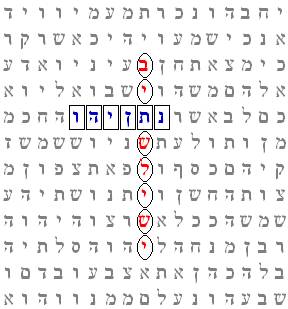| The Jews
already tried to rebuild the Temple. In 363 A.D., egged
on by the Roman Emperor Julian the Apostate, the Jews
tore down every remaining stone from the old temple to
begin rebuilding it. But God miraculously halted this
work.
Jesus
predicted that not one stone of the Jewish Temple would
remain atop another. The Romans utterly destroyed
the Temple in 70 A.D. What many people don't know
is that in 363 A.D. the Jews tried to rebuild it, but
God would have none of this. In doing so, Jews
themselves took the remaining stones from the Temple
Mount. In hindsight, the extraordinary act of Moshe Dayan handing over the
Temple Mount to the Muslims can actually be seen as an
Act of God. This is because, according to
Scripture -only after the Lord returns will the Jewish
Temple be rebuilt.
|
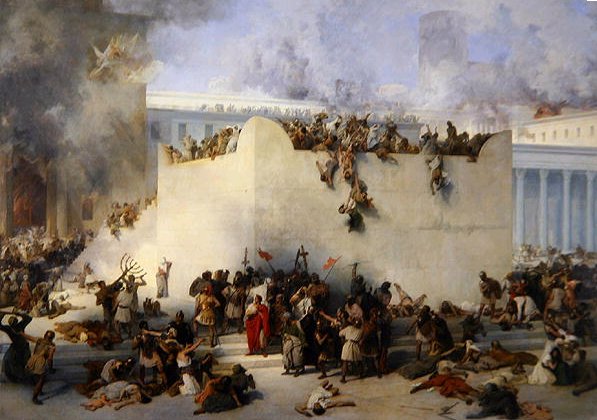 |
|
Destruction
of the Temple of Jerusalem by
Francesco Hayez |
The dual destruction of the two temples,
five hundred years apart, marks two central eras in
Jewish history: the first marks the beginning of the
Babylonian Exile; the second marks the beginning of the
Jewish Diaspora.
For the
last 1900 years, Jews have prayed that God would allow
for the rebuilding of the Temple. This prayer is a
formal part of the thrice daily Jewish prayer services.
A few,
very small, Jewish groups support constructing a Third
Temple today, but most Jews oppose this, for a variety
of reasons. Most religious Jews feel that the Temple
should only be rebuilt in the messianic era, and that it
would be presumptuous of people to force God's hand, as
it were. And these people are right! Conservative
Judaism has modified the prayers; their prayer books call
for the restoration of Temple, but do not ask for
resumption of animal sacrifices. Most of the passages
relating to sacrifices are replaced with the Talmudic
teaching that deeds of loving-kindness now atone for
sin.
The
religious Jewish religion was a temporary dispensation,
intended by its divine author, God himself, to prefigure
one more complete and perfect, and prepare men to
embrace it. It not only essentially required bloody
sacrifices (known as the korbanot), but enjoined a fixed and certain place for
them to be performed in; this was the temple at
Jerusalem. Hence the final destruction of this temple
was the abolition of the sacrifices, which annihilated
the whole system of this religious institution.
Jesus Himself made the perfect sacrifice for us when He
died on that cross atop Calvary. Any attempts by
the Jews to sacrifice animals again in the Temple can be
and was seen by God as a mockery of the Messiah's death.
God would not allow this in 363 A.D., and He won't allow
it now.
St.
Chrysostom shows that the destruction of Jerusalem is to
be ascribed, not to the power of the Romans, for God had
often delivered it from no less dangers; but to His
special providence. God was pleased to put these now
useless ceremonial observances out of business. "As a
physician," says Chrysostom, "by breaking the cup,
prevents his patient from indulging his appetite in a
noxious draught; so God withheld the Jews from their
sacrifices by destroying the whole city itself, and
making the place inaccessible to all of them."
St.
Gregory Nazianzen, Socrates, Theodoret, and other
Christian writers, are unanimous in what they say of
Julian's motive, ascribing to him the intention already
mentioned, of falsifying the scripture prophecies, those
of Daniel and Christ, which his actions sufficiently
evidence.
|
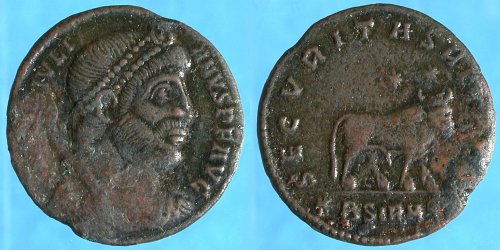
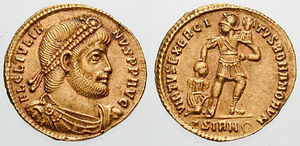
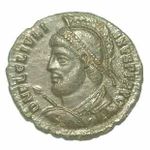
above a Julian
solidus, about 361 A.D. |
|
Julian II (The Apostate) (Flavius
Claudius Julianus) as
Augustus |
|
Caesar 355-360
AD: Augustus 360-363 AD
|
- Julian removed
Christianity from it's
position as the state
religion, an act that
earned him the title of
"Apostate".
|
|
|
Julian's
("The Apostate") historian, indeed, says, that he undertook
this work out of a desire of rendering the glory of his
reign immortal by so great an achievement: but this
was only an after-thought or secondary motive; and Sozomen in particular assures us that not only Julian,
but that the idolaters who assisted in it, pushed it
forward upon that very motive, and for the sake thereof
suspended their aversion to the Jewish nation.
Julian acted
not out of love for the Jewish people, but because he
was a pagan who - despite its ascendancy - despised
Christianity. Brought up as a Christian, Julian
rejected the religion and turned back to the paganism of
Greek and Roman days. He argued that Christianity would
weaken and ultimately destroy the Roman Empire. As a
result, he attempted to restore Hellenism, which earned
him everlasting Christian disdain.
Known to Christians as Julian the Apostate, the emperor
restored pagan temples and the cult of the old Roman
gods. These were to be served by a reform-minded pagan
clergy with high moral character, who would compete with
the Christian clergy in meeting the religious needs of
the people.
Julian
remains famous for having declared absolute freedom for
all religious beliefs - making him perhaps the first
leader to extend toleration of religion to all Romans.
Julian
himself wrote a letter to the body or community of the
Jews, extant among his works, mentioned by Sozomen,
and translated by Dr. Cave, in his life of St. Cyril. In
it he declares them free from all exactions and taxes,
and orders Julus or Illus, (probably Hillel,) their most
reverend patriarch, to abolish the apostoli, or
gatherers of the said taxes; begs their prayers, (such
was his hypocrisy,) and promises, after his Persian
expedition, when their temple should be rebuilt, to make
Jerusalem his residence, and to offer up his joint
prayers together with them.
On July 19th,
362 A.D., Julian left Constantinople and arrived in
Antioch to prepare for the invasion of Persia. However
busy he must have been, he met with "the chiefs of the
Jews." He assembled the chief among the Jews, and asked them
why they offered no bloody sacrifices, since they were
prescribed by their law. They replied, that they could
not offer any but in the temple, which then lay in
ruins.. He promised: "I shall endeavor with the utmost
zeal to set up the Temple of the Most High God." Whereupon he commanded them to repair to
Jerusalem, rebuild their temple, and re-establish their
ancient worship, promising them his concurrence towards
carrying on the work.
The
restoration of the Jewish Temple in Jerusalem would, in
Julian's opinion, defeat the Christian argument of
replacement theology - that the Church was the true
Israel, and that the Temple's destruction and the
subsequent exile was the just punishment suffered by the
Jewish people for the Crucifixion. The Temple's
restoration, Julian figured, would persuade Christian
converts that God still favored the Jewish people.
Also, As an army commander, embarking on a war against a
formidable Persian enemy, Julian could also expect that
the Jews of Mesopotamia would assist his legions.
The Jews received this warrant
to rebuild their Temple with
inexpressible joy, and were so elated with it, that,
flocking from all parts to Jerusalem, they began
insolently to scorn and triumph over the Christians,
threatening to make them feel as fatal effects of their
severity, as they themselves had heretofore from the
Roman powers.
In his "Four
Letters" addressed to the Jewish people, Julian
recognized their dire situation and appealed to them to
join him in his campaign. That's a vast difference from
the Persian ruler Cyrus, who had only allowed the Jews
to rebuild the Temple; Julian virtually ordered
them to do so, and perhaps, upset by their initial
hesitation, appointed Alypius, a pagan native of Antioch
and his best friend, to supervise the work.
The news was, no sooner spread abroad than
contributions came in from all hands. The Jewish women
stripped themselves of their most costly ornaments to
contribute towards the expense of the building. The
emperor also, who was no less impatient to see it
finished, in order to encourage them in the undertaking,
told them he had found in their mysterious sacred books
that this was the time in which they were to return to
their country, and that their temple and legal
observances were to be restored. He gave orders to
his treasurers to furnish money and every thing
necessary for the building, which would require immense
sums: he drew together the most able workmen from all
quarters, and appointed for overseers persons of the
highest rank, placing at their head his intimate friend Alypius, who had formerly been Pro-prefect of Britain;
charging him to make them labor in this great work
without ceasing, and to spare no expense.
The Jews were
doubtless divided between those who believed that Julian
was a savior and those who remembered Rabbi Simon Ben
Eliezer's warning against the youthful enthusiasm of the
second generation after the Bar Kochba disaster: "If
children tell you: 'Go, build the Temple - do not listen
to them.'"
All things
were In readiness, workmen were assembled from all
quarters; stone, brick, timber, and other materials, in
immense quantities, were laid in. The Jews of both sexes
and of all degrees bore a share in the labor; the very
women helping to dig the ground and carry out the
rubbish in their aprons and skirts of their gowns. It
its even said that the Jews appointed some pickaxes,
spades, and baskets to be made of silver for the honor
of the work. But the good bishop St. Cyril, lately
returned from exile, beheld all these mighty
preparations without any concern, relying on the
infallible truth of the scripture prophecies: as,
that
the desolation of the Jewish temple should last till the
end;
and that
one stone should not be left on another;
And being
full of the spirit of God, Cyril foretold, with the
greatest confidence, that the Jews, so far from being
able to rebuild their ruined temple, would be the
instruments whereby that prophecy of Christ would be
still more fully accomplished than it had been hitherto,
and that they would not be able to put one stone upon
another, and the event justified the
prediction.
Till then
the foundations and some ruins of the walls of the
temple subsisted, as appears from St. Cyril: and
Eusebius says, the inhabitants still carried away
the stones for their private buildings. These ruins the
Jews first demolished with their own hands, thus
concurring to the accomplishment of our Saviour's
prediction.
Then they began to dig the new foundation,
in which work many thousands were employed. But what
they had thrown up in the day was, by repeated
earthquakes, the night following cast back again into
the trench. "And when Alypius the next day earnestly
pressed on the work, with the assistance of the governor
of the province, there issued," says Ammianus,
"'such horrible balls of fire out of the earth near the
foundations,' which rendered the place, from time to
time, inaccessible to the scorched and blasted workmen.
And the victorious element continuing in this manner
obstinately and resolutely bent as it were to drive them
to a distance, Alypius thought proper to give over the
enterprise."
This is
also recorded by the Christian authors, who, besides the
earthquake and fiery eruption, mention storms, tempests,
and whirlwinds, lightning, crosses impressed on the
bodies and garments of the assistants, and a flaming
cross in the heavens, surrounded with a luminous circle.
The order whereof seems to have been as follows.
This
judgment of the Almighty was ushered in by storms and
whirlwinds, by which prodigious heaps of lime and sand
and other loose materials were carried away. After
these followed lightning, the usual consequence of
collision of clouds in tempests. Its effects were, first
the destroying the more solid materials, and melting
down the iron instruments; and secondly, the impressing
shining crosses on the bodies and garments of the
assistants without distinction, in which there was
something that in art and elegance exceeded all painting
or embroidery; which when the infidels perceived, they
endeavored, but in vain, to wash them out. In the third
place came the earthquake which cast out the stones of
the old foundations, and shook the earth into the trench
or cavity dug for the new; besides overthrowing the
adjoining buildings and porticoes wherein were lodged
great numbers of Jews designed for the work, who were
all either crushed to death, or at least maimed or
wounded. The number of the killed or hurt was increased
by the fiery eruption in the fourth place, attended both
with storms and tempests above, and with an earthquake
below. From this eruption, many fled to a
neighboring church for shelter, but could not obtain
entrance; whether on account of its being closed by a
secret invisible hand, as the fathers state the case, or
at least by a special providence, through the entrance
into the oratory being choked up by a freighted crowd,
all pressing to be foremost.
"This, however," says St.
Gregory Nazianzen, "is invariably affirmed and
believed by all, that as they strove to force their way
in by violence, the <Fire>, which burst from the
foundations of the temple, met and stopped them, and one
part it burnt and destroyed, and another it desperately
maimed, leaving them a living monument of God's wrath against sinners." This eruption
was frequently renewed till it overcame the rashness of
the most obdurate, to use the words of Socrates; for it
continued to be repeated as often as the projectors
ventured to renew their attempt, till it had fairly
tired them out.
Lastly, on the same evening, there
appeared over Jerusalem a lucid cross, shining very
bright, as large as that in the reign of Constantine,
encompassed with a circle of light. "And what could be
so proper to close this tremendous scene, or to
celebrate this decisive victory, as the <Cross>
triumphant, encircled with the <Heroic> symbol of
conquest?"
This
miraculous event, with all its circumstances, is related
by the writers of that age; by St. Gregory Nazianzen in
the year immediately following it; by St. Chrysostom, in
several parts of his works, who says that it happened
not twenty years before, appeals to eye-witnesses still
living and young, and to the present condition of those
foundations, "of which," says he, "we are all
witnesses;" by St. Ambrose in his fortieth epistle
written in 388; Rufinus, who had long lived upon the
spot; Theodoret, who lived in the neighborhood in Syria;
Philostorgius, the Arian; Sozomen, who says many were
alive when he wrote who had it from eye-witnesses, and
mentions the visible marks still subsisting; Socrates,
&c. The testimony of the heathens corroborates this
evidence; as that of Ammianus Marcellinus above quoted,
a nobleman of the first rank, who then lived in the
court of Julian at Antioch and in an office of
distinction, and who probably wrote his account from the
letter of Alypius to his master at the time when the
miracle happened.
Libanius, another pagan friend and
admirer of Julian, both in the history of his own life,
and in his funeral oration on Julian's death, mentions
these earthquakes in Palestine, but with a shyness which
discovers the disgrace of his hero and superstition.
Julian himself speaks of this event in the same covert
manner.
With Julian's death came the Emperor Jovian, a faithful
Christian, and a Church-led assault on Jews and Judaism.
The early
church historian Socrates testifies, that at the sight of the
miracles, the Jews at first cried out that Christ is
God; yet returned home as hardened as ever. St. Gregory Nazianzen says, that many Gentiles were converted upon
it, and went over to the Church. Theodoret and Sozomen
say many were converted; but as to the Jews, they
evidently mean a sudden flash of conviction, not a real
and lasting conversion. The incredulous blinded
themselves by various presences: but the evidence of the
miracle leaves no room for the least cavil or suspicion.
The Christian writers of that age are unanimous in
relating it with its complicated circumstances, yet with
a diversity which shows their agreement, though perfect,
could not have been concerted. The same is confirmed by
the testimony of the most obstinate adversaries. They
who, when the temple at Daphne was consumed about the
same time, by lightning, pretended that it was set on
fire by Christians, were not able to suspect any
possibility of contrivance in this case: nor could the
event have been natural. Every such suspicion is removed
by the conformity of the event with the prophecies: the
importance of the occasion, the extreme eagerness of
Jews and Gentiles in the enterprise, the attention of
the whole empire fixed on it, and the circumstances of
the fact. The eruption, contrary to its usual nature,
was confined to one small spot; it obstinately broke out
by fits, and ceased with the project, and this in such a
manner, that Ammianus himself ascribes it to an
intelligent cause.
The phenomena of the cross in the
air, and on the garments, were admirably fitted, as
moral emblems, to proclaim the triumph of Christ over
Julian, who had taken the cross out of the military
ensigns, which Constantine had put there to be a lasting
memorial of that cross which he had seen in the air that
presaged his victories. The same was again erected in
the heavens to confound the vanity of its impotent
persecutor. The earthquake was undoubtedly miraculous;
and though its effects were mostly such as might
naturally follow, they were directed by a special
supernatural providence, as the burning of Sodom by fire
from heaven. Whence Mr. Warburton concludes his
dissertation on this subject with the following
corollary. "New light continually springing up from each
circumstance as it passes in review, by such time as the
whole event is considered, this illustrious miracle
comes out in one full blaze of evidence."
Even Jewish Rabbis,
who do not copy from Christian writers, relate this
event in the same manner with the fathers from their
own traditions and records. This great event
happened in the beginning of the year 363. St. Chrysostom admires the wonderful conduct of divine
providence in this prodigy, and observes, that had not
the Jews set about to rebuild their temple, they might
have pretended they could have done it: therefore did
God permit them thrice to attempt it; once under Adrian,
when they brought a greater desolation upon themselves;
a second time under Constantine the Great, who dispersed
them, cut off their ears, and branded their bodies with
the marks of rebellion. He then relates this third
attempt, "in our own time," as he says, "not above
twenty years ago, in which God himself visibly baffled
their endeavors, to show that no human power could
reverse his decree; and this at a time when our religion
was oppressed, lay under the axes, and had not the
liberty even to speak; that impudence itself might not
have the least shadow of presence." |




